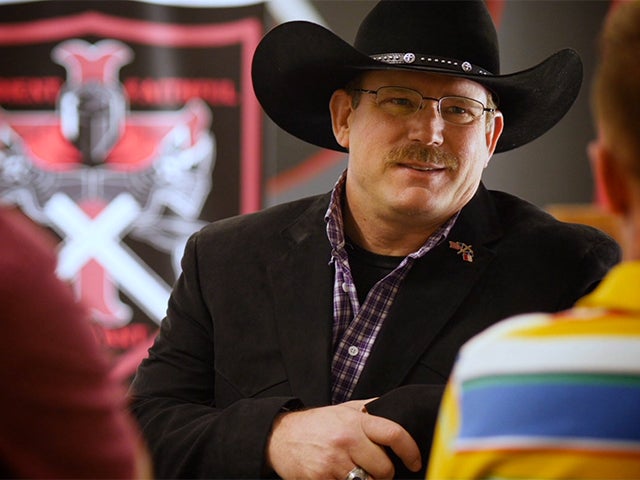Using Trauma to Help the Traumatized
Gary Buckaloo had a twenty-year career in the military. Although he never saw combat, as a child, he experienced post-traumatic stress at the hands of his stepfather. “I would have breakdowns, just fearful of this guy,” he says. “He would pick me up by the ears and smash my head against the wall and it knocked a hole in the wall. One time I got sick and I vomited on the floor and he jerked me off the chair and rubbed my nose in it like a dog. My life was terrible and I lived in a constant fear--and I couldn't tell my mother.”
Gary’s mother and father divorced when he was a boy. and his mother married five more times. Several of his stepfathers physically abused Gary and another relative sexually abused him. “You can see it in the pictures. I’m a smiling child, and then you see just nothing. Just a blank stare,” Gary says. “Living in that kind of intense, just waiting for something bad to happen, it's so strenuous and it sticks with you.”
He had a brief exposure to Christianity when he visited a local church as a boy. “A cousin of mine was going to church and I found a peace there,” he recalls. “And so, at night, when I was trying to go to sleep, I would start singing the songs that I heard in Sunday school and it brought me a peace and a calmness. As I grew up, that went away. ‘He’s not real, he's just somebody that, you know, man made up to control the masses.'"
At school Gary was also bullied but eventually he learned to fight back. “I felt empowered and it just grew more and more violent,” he says. “It grew more and more violent to the point where I was fighting three or four times a week, which landed me in jail as a kid. And finally, one of the judges here said, ‘Listen, you need to make a decision. You can either spend some time in Juvenile Hall or you can go down and join the service.’”
In the Navy, Gary’s fighting and carousing got even worse. “Through my entire Navy career that's how I was, and led to divorces, it led to all these things that I never wanted to do, and it led to that. And I'd always wondered, you know, "What am I missing?’”
When Gary’s birth father was shot and killed in a bar fight, and his best friend committed suicide, Gary began to take stock of his life. “There were times where I'd considered going back to church or something. The convictions would fade, just like the hangovers. “
He retired from the military and started a business. but the rowdiness continued. one evening, Gary was hit by a car in a bar parking lot after an altercation. “It almost killed me,” he says, “and I started thinking, ‘If you live by the sword, you die by the sword.”
Gary met and married Lisa, and began singing with a country band, he was a military finalist on the Nashville Star TV show, but Lisa encouraged him to use his gift for God. “She said, ‘I just don't understand why you would take a talent that God gave you and give it to people that could care less." Gary responded. ‘I’ll tell you why I'm not going to be one of those hypocrites that come to church on Sundays, and then knowing that Friday nights and Saturday nights I'm at bars.’ She spins around and looks at me with tears in her eyes and says to me, ‘Why don't you get on that stage and don't be a hypocrite?’ I mean like a flood of conviction, a flood of guilt--it dropped me to my knees. I couldn't catch my breath. And I was so sorry to God. And it was at that time when I knew that my life would never be the same and I gave my life to Christ.”
Gary got sober, and began taking theology and counseling classes in the Regent University online program and received his degree in spring of 2018. “I wanted to give glory to God, and what better way to be obedient than to go study the Word at a Bible college?“
Today he and Lisa have nine natural and adopted children between them. Gary also founded the “Church of the Good Soldier” in Conroe, Texas, and ministers to veterans who are struggling with PTSD.
“The suicide rate amongst veterans is so high--post-traumatic stress, shell shock, battle fatigue. They allow these guys, through equine therapy or EMDR treatment, to not only address the issues but how to process them,” Gary says. “And while they are doing that, they are also building up their faith in Christ. They feel loved where they’re at. Because if you can't reach them, you can't pull them out of where they’re at. That garbage we're running from, we carry with us, and if we don't ask Christ to come in there and remove that, it's never going to get removed.”




